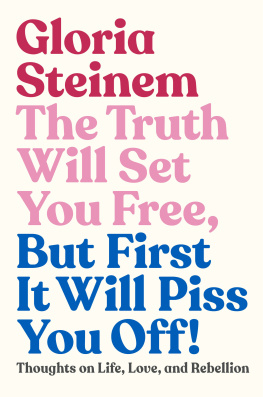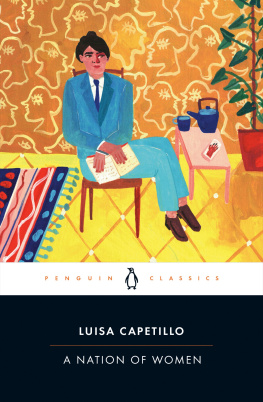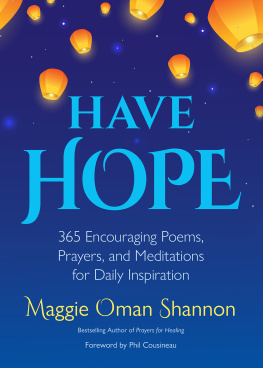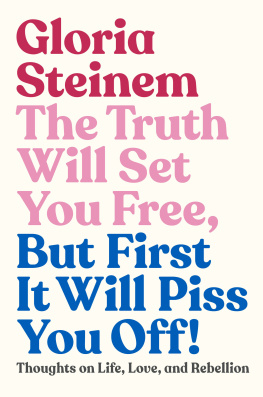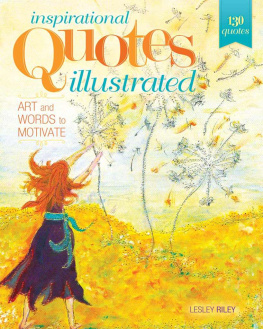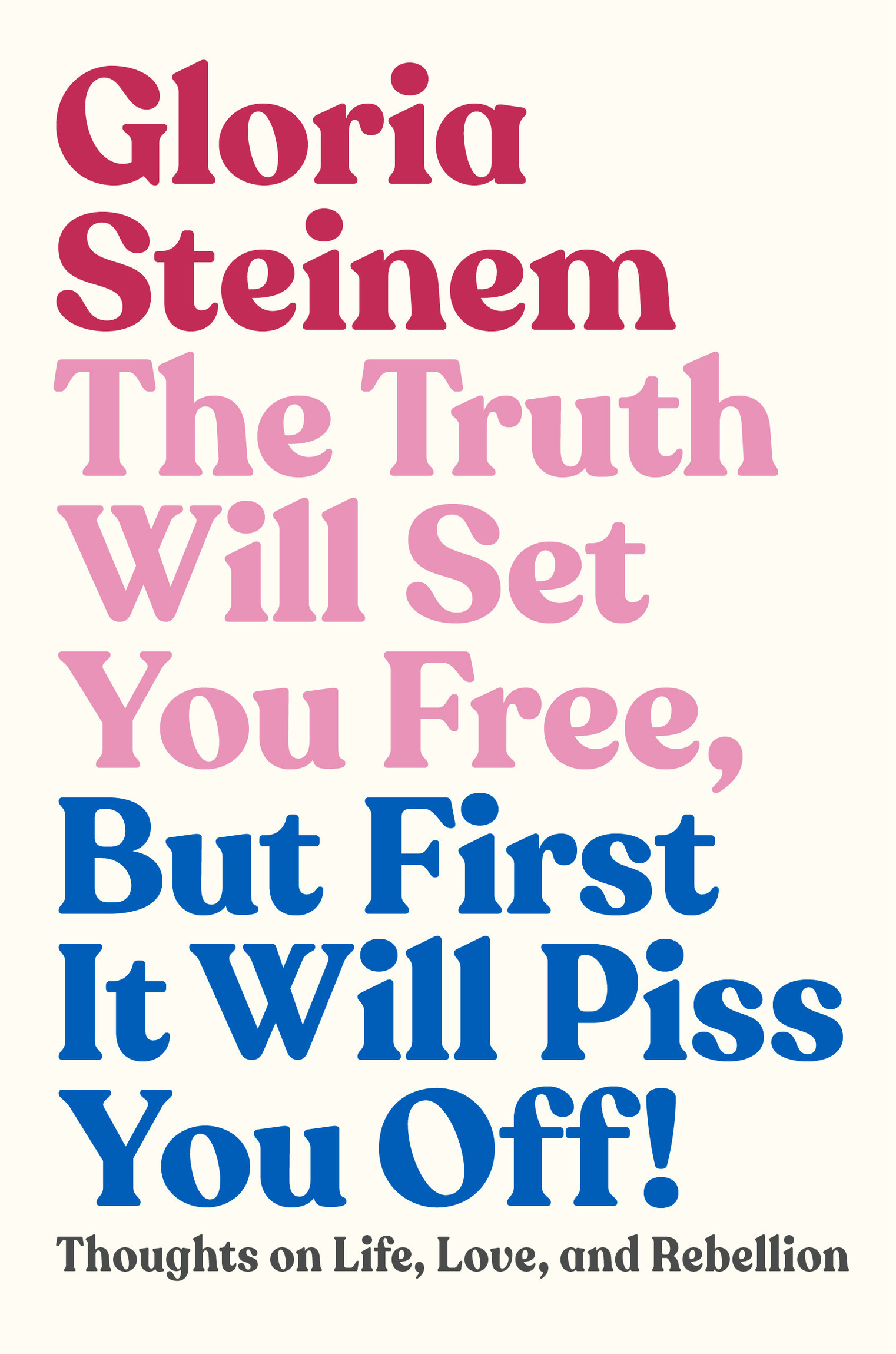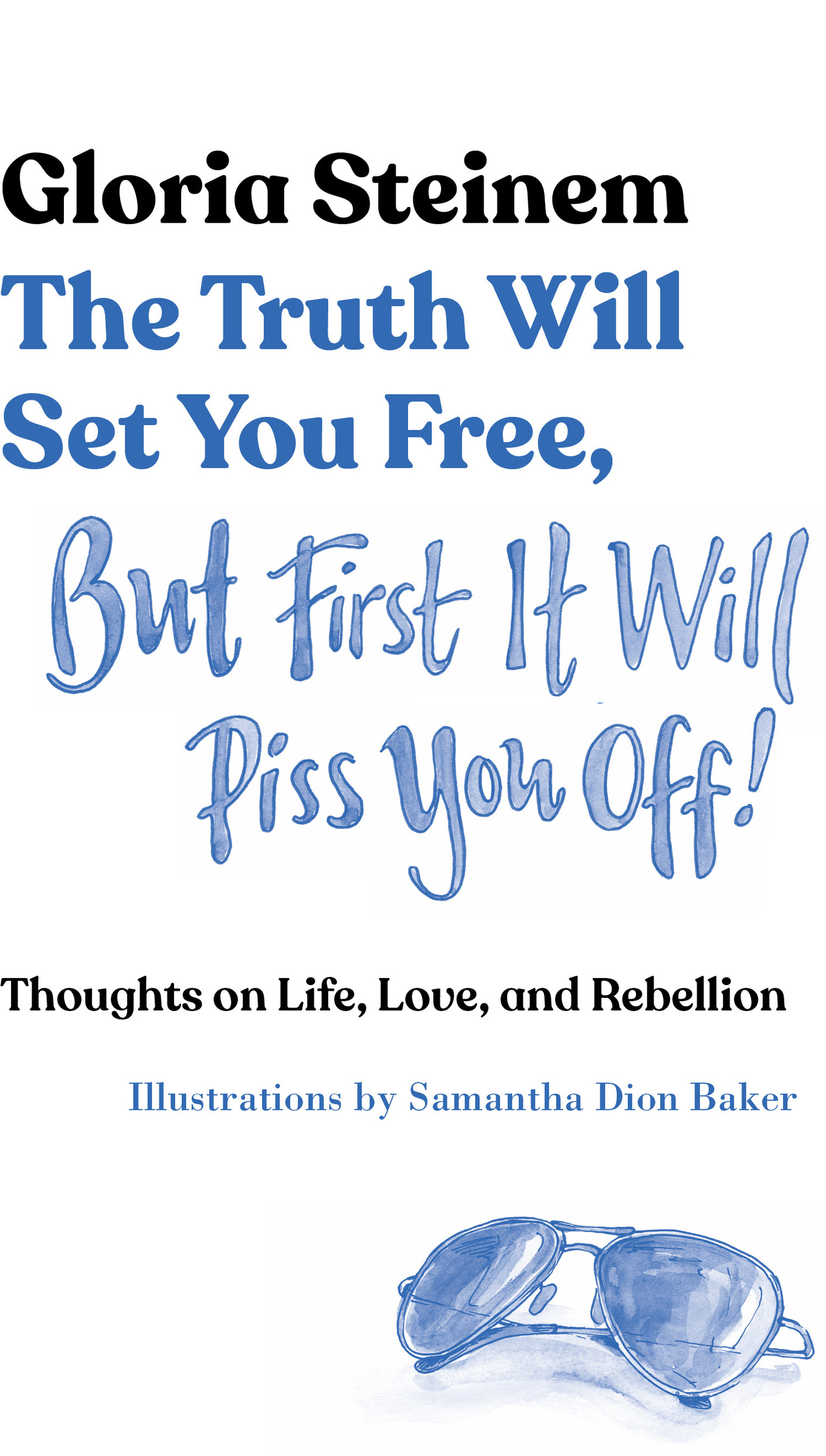Contents
Landmarks
Print Page List
Copyright 2019 by Gloria Steinem
All rights reserved.
Published in the United States by Random House, an imprint and division of Penguin Random House LLC, New York.
R ANDOM H OUSE and the H OUSE colophon are registered trademarks of Penguin Random House LLC.
Grateful acknowledgment is made to Alfred A. Knopf, an imprint of the Knopf Doubleday Publishing Group, a division of Penguin Random House LLC, and The Wallace Literary Agency, a division of Robin Straus Agency, Inc., for permission to reprint an excerpt from To Be of Use from Circles on the Water by Marge Piercy, copyright 1973, 1982 by Middlemarsh, Inc. Rights in the United Kingdom are controlled by The Wallace Literary Agency. Reprinted by permission of Alfred A. Knopf, an imprint of the Knopf Doubleday Publishing Group, a division of Penguin Random House LLC, and The Wallace Literary Agency, a division of Robin Straus Agency, Inc.
LIBRARY OF CONGRESS CATALOGING-IN-PUBLICATION DATA
Names: Steinem, Gloria, author. | Baker, Samantha Dion, illustrator.
Title: The truth will set you free, but first it will piss you off : thoughts on life, love, and rebellion / by Gloria Steinem ; illustrations by Samantha Dion Baker.
Description: New York : Random House, [2019]
Identifiers: LCCN 2019029832 (print) | LCCN 2019029833 (ebook) | ISBN 9780593132685 (hardcover) | ISBN 9780593132692 (ebook)
Subjects: LCSH: Steinem, GloriaQuotations. | FeminismQuotations, maxims, etc. | InspirationQuotations, maxims, etc. | Quotations, American. | Quotations, English.
Classification: LCC HQ1413.S675 S735 2019 (print) | LCC HQ1413.S675 (ebook) | DDC 305.42dc23
LC record available at https://lccn.loc.gov/2019029832
LC ebook record available at https://lccn.loc.gov/2019029833
randomhousebooks.com
Cover design: Laura Palese
v5.4_r1
ep
Contents
Somewhere between poetry and journalism lies the magical land of quotes. They may be fact or fantasy, personal or political, from academia or the street, but they are smart enough to be memorable and short enough to remember.
You might say they are the poetry of everyday life.
A quote can turn a tweet into a haiku because it evokes a story. Indeed, if you poured water on a quote, it would become a story. Tell me a fact and Ill forget, as a Native American quote goes, but tell me a story and Ill always remember.
If a quote evokes more than one story, its likely to last a very long time.
Take the first half of the title of this book: The truth will set you free. That was said by Jesus in the Bible, and the truth was the Word of God. Academics used the same quote to say that knowledge would set you free. Then during the war in Vietnam, young men wrote that quote on protest signs, hoping that the truth of the war would set them free from the draft.
It was then that I added, But first it will piss you off. Thats because I was pretty sure we were not only in the wrong war, we were also on the wrong side.
If this sounds far out even now, let me tell you a story of my own.
I lived in India for a couple of years after college, and I learned that Ho Chi Minh, our enemy-to-be in Vietnam, was a much-admired anticolonial hero whose model for getting the French out of his country was the American Revolution. He also risked his life to rescue our pilots downed in the jungle during World War II, and he impressed them by reciting our entire Declaration of Independence by heart.
With the hope of making a human connection to a man who was supposed to be our enemy, I researched, wrote, and published an essay about Ho Chi Minh. I have to say this had no public impact at all. I also learned that some veterans who knew and liked Ho Chi Minh during the war had gone to Washington to plead the case. They had no impact either.
I felt pissed off and powerless, as if I were living in an alternate universe. On my bulletin board, I put this quote of my own: Alienation is when your country is at war, and you want the other side to win.
Soon more truths of the war began to come out of hiding. Our government had been concealing death statistics in order to downplay our casualties, exaggerate Ho Chi Minhs casualties, and make the war seem under control. Before the end came, thousands of Americans would lose their lives on the battlefield, and more from Agent Orange and Vietnam-related damage to their spirits and bodies, plus millions of Vietnamese soldiers and civilians in both north and south.
Eventually, the sheer number of Americans marching and opposing the war forced President Lyndon Johnson to resign and President Richard Nixon to preside over our retreat. Vietnam became the first war this country ever lost.
But movements dont only create change in the outside world, they transform people in them. Many women had organized against Vietnamand for civil rights, against nuclear testing, and moreso they learned they could have a public impact. Yet they also learned that even in those idealistic movements, women were not treated as equals by many of the men.
This pissed a lot of women off. I began to see feminist slogans, including the title of this book, which I thought no one had noticed, on T-shirts and buttons, bulletin boards, campus banners, and even sidewalks as graffiti.
There also turned out to be a parallel to this title in programs for and by alcoholics: The truth will set you free, but first it will make you miserable. Is this related? I have no idea.
Its always honorable to credit the source of a quote, which also helps to explain its meaning, but claiming ownership of a quote is often beside the point. We all contribute to the collective unconscious from which quotes come.
Even all these decades after this quote emerged in the peace and feminist movements, I see the hybrid title of this book on posters and painted on the side of a truck, in demonstrations, online, in needlepoint, and even as a tattoo. In tragedies, we might now also say, the truth will set you freebut first it will make you mourn. Alice Walker always reminds me of that.
As I write this, for instance, Ive just returned from speaking in the grand old Castro Theatre in San Francisco, together with artist and activist Favianna Rodriguez. Though I dont remember either of us repeating this quote during our talk, a young hijab-wearing woman in the audience came up afterward to say that it was her favorite, and that she had translated it into Persian and Kurdish for her feminist blog in Iran. Why? Because it applied to womens lives there.
Who would have guessed? She was a reminder that quotes go global.
Even before the World Wide Web, quotes were contagious. Almost fifty years ago, Simone de Beauvoir and other women in France wrote I have had an abortion on a petition, demanded the repeal of antiabortion laws, and gathered hundreds of signatures. In the first issue of Ms. magazine, we followed their example with a petition signed by hundreds of women in the United States. It was this shared and personal quote that made all the difference.

